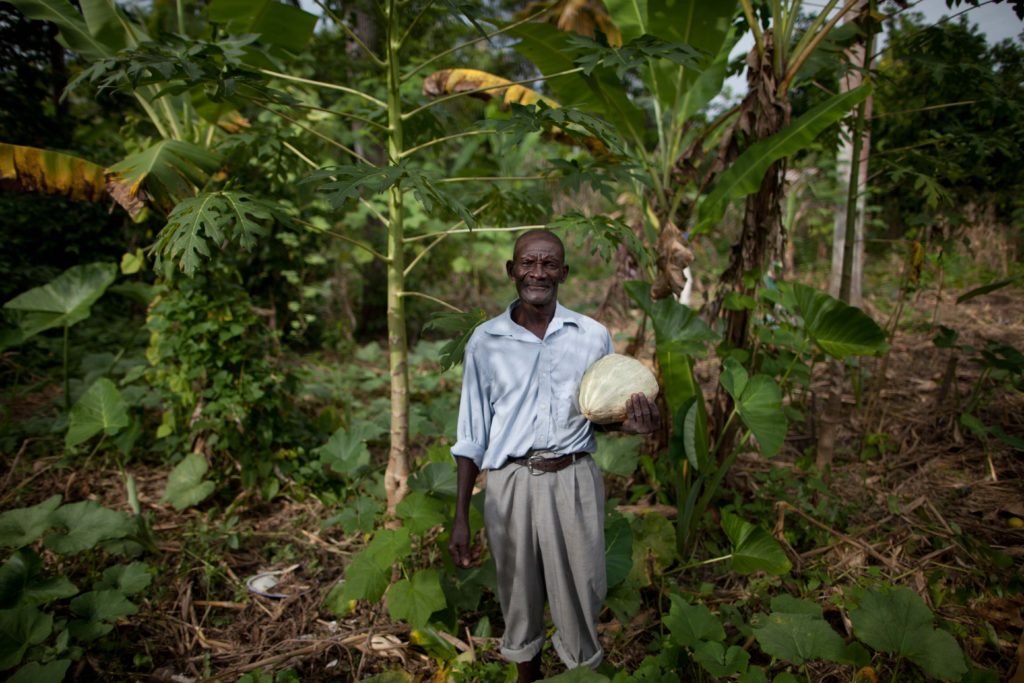New Evidence of Impact: Agroecology as a Poverty Solution in Haiti

Since 2009, Groundswell International has been collaborating with Partenariat pour le Développement Local (PDL) in Haiti to strengthen farmers’ associations in the north of Haiti’s Central Plateau basin to regenerate their farmland and improve their lives. PDL has strengthened 14 peasant organizations, with over 9,900 farmers adapting agroecological farming strategies and spreading them farmer-to-farmer. These organizations also manage community savings & credit coops, seed banks, grain reserves, and cooperative enterprises for value-added food processing and local marketing.
“We are strengthening the capacity and agency of community and peasant organizations because this creates the space for decentralized, agroecological technical innovation,” says Cantave Jean-Baptiste, Director of PDL. “Individual farmers cannot do it alone, but much can be learned through farmer-to-farmer training. We continue to face political and economic crises on a daily basis, but the country will need sound alternatives like these in order to wake up from the ashes.”
To evaluate the impact of this work, in 2021 we collaborated with Altus Impact, based in Switzerland, and the Economics of Land Degradation (ELD) Initiative, based in Bonn, Germany, on an assessment grounded in environmental economics. Evaluators carried out surveys of 330 households, sampled from three communal sections in northern Haiti, comparing the ‘farm budgets’ of agroecological versus conventional farmers (the value of all production, less all costs of all inputs and labor). They also analyzed satellite data to validate land productivity of the surveyed farms.
Findings – Agroecological Farming in Haiti: A Poverty Crisis Solution
The results are summarized in the Policy Brief – Agroecological Farming in Haiti: A Poverty Crisis Solution. Key findings include:
- The adoption of agroecological farming leads to impressive increases in productivity and a doubling of per-hectare profitability in the program area.
- Controlling for inputs and labor, typical agroecological farmers have gross, annual crop incomes that are US $437 higher per hectare than average conventional farmers.
- Satellite data confirmed higher land productivity, vegetative cover, and climate resilience for agroecological plots, even when receiving less rainfall.
- Additionally, these agroecological practices can increase water retention and carbon sequestration in the soil, reduce topsoil losses and mudslides, and increase food security.
Background on the Poverty in Haiti
These are significant impacts in a country where as many as 90% of rural people live below the poverty line, and over 30% of the population lives in extreme poverty (incomes of less than US $2.15/day or US $785/year ). In 2022, the Food and Agricultural Organization (FAO) ranked Haiti in the 10 worst hunger crises in the world, with 4.3 million in need of immediate food assistance.
Over 4.8 million of Haiti’s population of 11.45 million live in rural areas, and agriculture and fisheries provide employment to half the labor force but account for less than 20 percent of GDP. Due to neglect and ineffective support to farmers over decades and international trade policies that have undermined local food production, Haiti must import a growing and significant portion of the agricultural products it consumes. The country continues to be impacted by a historical model of extractive economic and agricultural development, political and institutional instability, increasing gang violence, extreme levels of insecurity, and high vulnerability to climate change and natural disasters.
Agroecological Solutions for the Poverty in Haiti
According to the study, “scaling-up of agroecological model farming would result in a significant economic infusion into rural communities, improvements in livelihoods and enhanced climate resilience. …. Farmer-centered and decentralized agricultural innovation, extension and development needs to be supported.”
Specifically, if agroecological farmers were able to extend these practices to the remaining ⅔ of their land, the study projects they would earn an additional annual net income of US $553, totaling US $990 per year. Extending it to the rest of Haiti’s approximately 1 million smallholder farmers would generate ground-up economic growth based on the agency of Haiti’s rural communities and the regeneration of their land. To make this a reality, further action is needed and outlined in this study, as well as by other organizations, as a solution based on “decentralized agricultural innovation, extension and development, and the regeneration of degraded land and rural livelihoods.”
